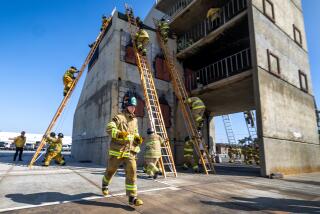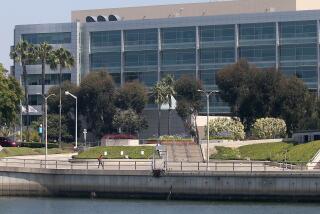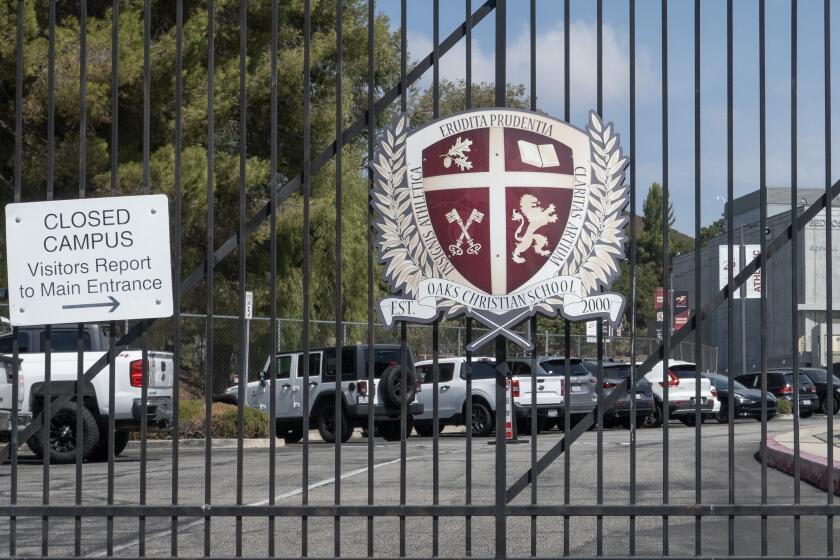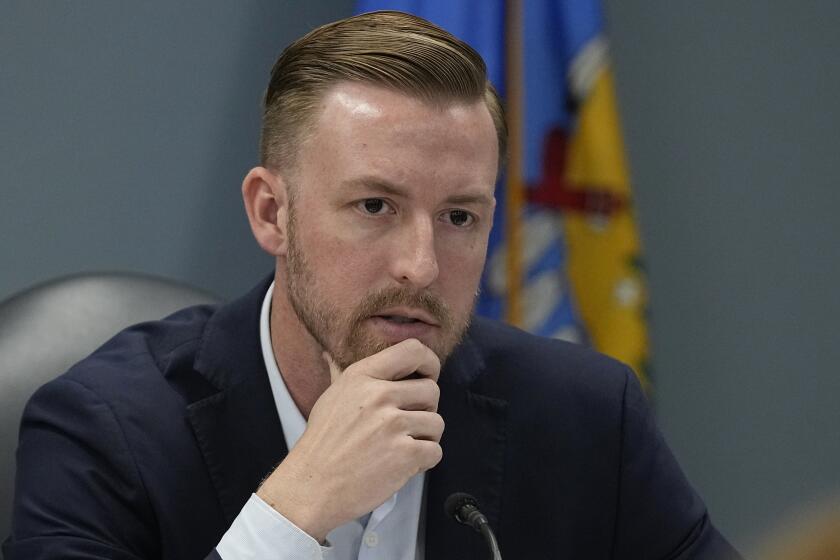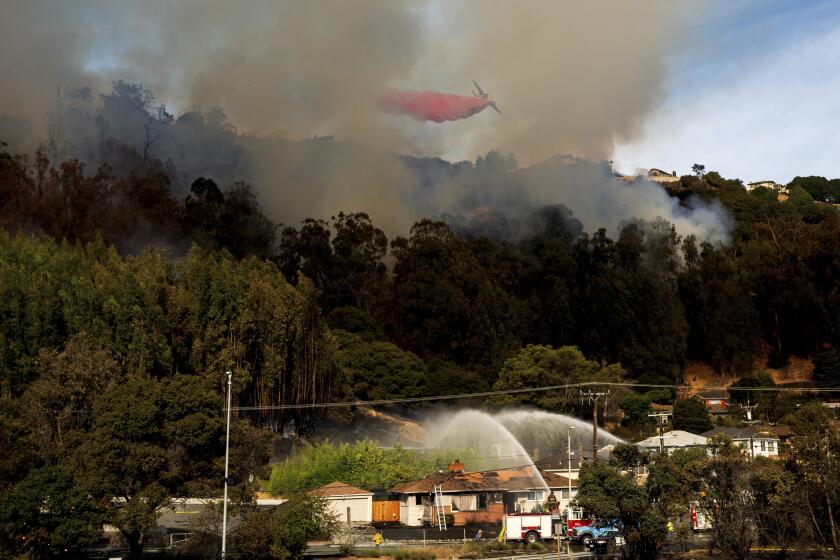Outstanding Debts Being Reduced, CSUN Says
Acknowledging lax bookkeeping and past troubles keeping track of state money, Cal State Northridge officials said Friday they have collected most of $512,688 in outstanding payroll, salary and travel advances to employees. The accumulated debt had been little noticed and largely unaccounted for until flagged in a state audit.
CSUN finance officials, speaking directly for the first time on the advances, say they cannot explain exactly how the debts so quickly piled up during the early 1990s.
But they promised that a revamping of the school’s accounting system, started last year, will prevent the cash-strapped campus from losing track of such funds again. They said the revised procedures have already started addressing many of the problems.
“We have established policies and procedures to assure that payroll and/or salary accounts receivable will not accumulate in the future,” said CSUN President Blenda J. Wilson in a memo released Friday summarizing a campus investigation of the debts. “We have initiated a comprehensive cross departmental program to design a new automated personnel, payroll, purchasing, accounting and budgeting system.”
Wilson ordered an inquiry into outstanding advances and debts following stories in The Times reporting that $675,563 was owed to the university and its auxiliaries, such as the Associated Students. The outstanding advances were first reported in an audit by the California State University system’s Office of the University Auditor, published a year ago.
In response to the audit, CSUN made several improvements to its accounting system, including the hiring of a interim controller in January.
As a result, campus officials said Friday, outstanding salary and payroll advances totaling $425,000 were reduced substantially. Of the that amount, $288,371 was repaid and $93,000 was declared uncollectable. The university is still attempting to collect the outstanding $43,629.
In addition, unpaid travel advances totaling $87,688 were also repaid as of Friday, campus officials said.
The more than $500,000 in uncollected advances drew campuswide attention when the state controller’s office released a list of current and former employees whose debts were deemed uncollectable. The list contained the names of 12 current and 28 former CSUN employees, from clerks to professors, who allegedly owed $81,666.
None of the dozen current CSUN employees on the list, compiled by the school’s Accounting Services Department in April and May 1996 and sent to the state, was told money was owed. All 12 employees said that they did not owe the university money, and many were angry and dismayed at being cited in a public document, allegedly for not paying their debts.
Wilson and other CSUN officials said Friday they were dismayed at the characterization of their current and past employees as “deadbeats” in a Times article Sunday about the list. Wilson said it is “untrue that any university finance official in any position of responsibility for this matter has ever referred to the university employees as deadbeats.”
The money listed as owed by the 40 employees was the bulk of the $93,000 that campus finance officials had declared uncollectable.
The officials said Friday they decided to write off the $93,000 because the school lost records during the 1994 Northridge earthquake. Some records apparently were thrown out with earthquake debris; others may have been lost as the university hurriedly attempted to store records retrieved from damaged buildings, they said.
School officials have acknowledged, however, they did not simply ask the current and former employees to pay back the money.
To avoid a repeat of the confusion concerning the list, the campus payroll office will now notify employees by letter how much money they owe the university and why. Employees can pay immediately or through installments, according to campus officials.
Robert J. Kiddoo, interim CSUN controller, said the payroll and salary advances appeared to have accumulated because of spotty campus bookkeeping and lax collecting procedures that have since been improved. He said, for example, that some employees ended up owing money because they missed a day or more of work at the end of the month, after payroll time sheets had been submitted. As a result, the employee was listed on the books as owing a day’s pay.
In other instances, employees embarking on sabbaticals at lower pay had received one or more monthly paychecks at their normal salary. Those and similar payroll adjustments accounted for much of the owed money, said Kiddoo, who assisted in the campus investigation.
Apparently the campus payroll department did not keep close watch over such accounting, and employees were left to keep track of the money they owed, Kiddoo said.
“Probably what happened, they trusted a lot of people to do what was right,” Kiddoo said. “There was some follow-up, but it was spotty.”
Kiddoo said the campus should have kept better track of the funds. “As a professional, I don’t believe it should happen that way,” said Kiddoo, who is also an accounting professor at the school.
The $675,000 that was listed as unpaid debts included $162,875 that was owed to several campus auxiliaries, such as the Associated Students, University Corp. and University Foundation, according to the state audit and campus officials. The University Corp. runs various concessions on campus, and the University Foundation, which once ran the concessions, now acts as a fund-raising arm of the university.
The Times initially reported, based on an explanation from a campus spokesman, that the auxiliaries owed the school the $162,875. This characterization was wrong, Wilson said Friday, and has undermined the school’s fund-raising efforts.
“In misrepresenting the University Foundation as owing money to the university, the story implies that the university’s fund-raising organization is negligent in its business practices,” Wilson said in her memo. “Potential donors have already refused to pay gift pledges because of the Times’ error.”
The amount owed the auxiliaries has also been reduced substantially, Kiddoo said. Of the $162,875, about $36,000 remains to be collected. Those debts were accrued in various ways. Some firms, for example, owe thousands of dollars to the campus auxiliaries for failing to pay rent for campus dormitories and food service during privately operated summer programs, Kiddoo said.
Finally, school officials also attempted to clarify another figure concerning advances to university employees. Last month, a campus spokesman had said that about $250,000 of the payroll and salary advances were so-called hardship allowances to about 600 employees, sometimes to address personal emergencies. On Friday, Kiddoo said he did not know of any hardship allowances and could not explain why that information was released.
Enriquez is a Times staff writer and Thampi is a correspondent.
More to Read
Sign up for Essential California
The most important California stories and recommendations in your inbox every morning.
You may occasionally receive promotional content from the Los Angeles Times.
